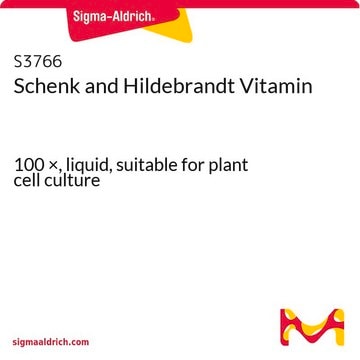S7757
Sodium thiocyanate
reagent grade, 98-102% (titration)
Sinónimos:
Sodium isothiocyanate, Sodium rhodanate, Sodium rhodanide, Sodium sulfocyanate
About This Item
Productos recomendados
grade
reagent grade
assay
98-102% (titration)
form
powder
pH
4.8 (20.1 °C, 1070 g/L)
mp
287 °C (dec.) (lit.)
SMILES string
[Na]SC#N
InChI
1S/CHNS.Na/c2-1-3;/h3H;/q;+1/p-1
InChI key
VGTPCRGMBIAPIM-UHFFFAOYSA-M
¿Está buscando productos similares? Visita Guía de comparación de productos
Application
- Effect of Sodium Thiocyanate and Sodium Perchlorate on Poly(N-isopropylacrylamide) Collapse: This research investigates the effects of sodium thiocyanate on the collapse of poly(N-isopropylacrylamide). The study provides insights into the molecular interactions and thermodynamic behavior of this polymer in the presence of thiocyanate ions (Pica & Graziano, 2020).
signalword
Danger
Hazard Classifications
Acute Tox. 4 Dermal - Acute Tox. 4 Inhalation - Acute Tox. 4 Oral - Aquatic Chronic 3 - Eye Dam. 1
supp_hazards
Storage Class
13 - Non Combustible Solids
wgk_germany
WGK 1
flash_point_f
Not applicable
flash_point_c
Not applicable
Certificados de análisis (COA)
Busque Certificados de análisis (COA) introduciendo el número de lote del producto. Los números de lote se encuentran en la etiqueta del producto después de las palabras «Lot» o «Batch»
¿Ya tiene este producto?
Encuentre la documentación para los productos que ha comprado recientemente en la Biblioteca de documentos.
Los clientes también vieron
Nuestro equipo de científicos tiene experiencia en todas las áreas de investigación: Ciencias de la vida, Ciencia de los materiales, Síntesis química, Cromatografía, Analítica y muchas otras.
Póngase en contacto con el Servicio técnico










